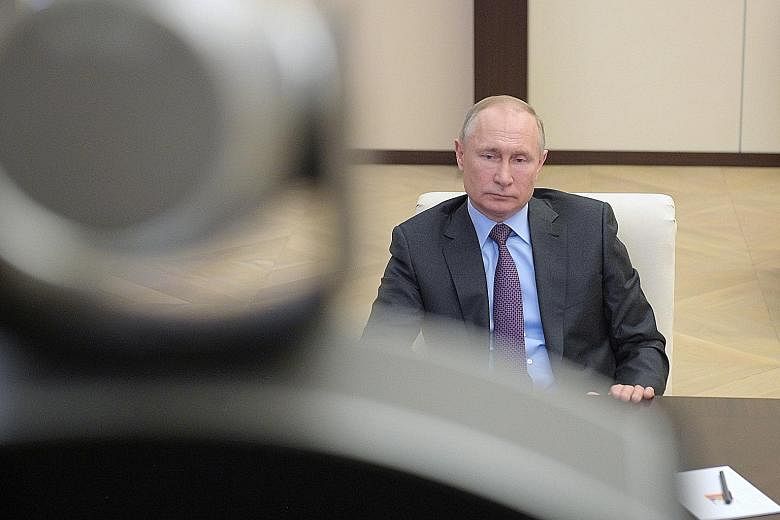MOSCOW • President Vladimir Putin's deal with Opec to cut oil output and boost prices three years ago was a triumph for the Russian leader, bolstering his clout on the global stage. But now he has had to make stinging concessions after US President Donald Trump stepped in to end a price war.
Amid relief in Moscow at the unprecedented deal with Saudi Arabia and other major producers to slash oil output, the accord marks a painful setback for Russia, said two people close to the Kremlin.
Mr Putin had catapulted Russia into a dominant role in global energy politics and drove a wedge between the United States and its Saudi ally, as the two marshalled producers to limit supplies. But it is now clear he overplayed his hand when he refused to meet Saudi demands to double output cuts just five weeks ago. Opec's biggest producer cranked up output in a price war that crashed the market just as the coronavirus demolished demand.
With markets collapsing, Mr Putin agreed to cut more than 2.5 million barrels a day of crude from the 11 million of combined crude and condensate Russia pumps each day, more than four times the reduction that he turned down early last month and more than what Saudi Arabia is obliged to cut from its output level last month.
Meanwhile, hopes that the US would formally commit to its own curbs have evaporated, even as Mr Trump takes credit for bringing about the new deal.
'MUCH HIGHER PRICE'
The ill-fated decision to face off against Saudi Arabia was "a strategic mistake and now we're paying the price, a much higher price than we could have paid", said Mr Andrey Kortunov, director of the Kremlin-founded Russian International Affairs Council.
"This looks like a victory for the US, and Russia ends up a bigger loser than Saudi Arabia."
If the cuts are achieved, Russia's output for the next two months will drop to the annual average last seen in 2003, according to Bloomberg calculations based on data from the Russian Energy Ministry and BP's Statistical Review.
Russia agreed to continue smaller cuts until May 2022, though it did manage to hold onto one concession by keeping condensate, a light fuel of which it is a major producer, out of the quotas.
But Russia completely failed to anticipate the devastating impact of the coronavirus pandemic on the world economy when it walked away from the agreement with the Organisation of the Petroleum Exporting Countries (Opec) and other big producers known as Opec+, said a senior Russian official.
Holding that alliance together would have prevented the collapse in prices to an almost two-decade low that followed. Now, the Kremlin has had to negotiate a new arrangement under highly unfavourable terms, he said.
The decision to compromise over the cuts to crude output is painful for Mr Putin's political image, but it is essential as a step towards overcoming the crisis, said another person close to the Kremlin.
The final agreement, which foresees a gradual lifting of the supply restrictions starting from July, was coordinated with all major Russian oil companies and had Mr Putin's personal stamp of approval. Even symbolic US participation is seen as an important milestone.
Mr Putin's spokesman, Mr Dmitry Peskov, defended the new deal last Friday. "There are no losers, there are only winners," he told reporters on a conference call. The main state TV news programme hailed the pact as an "unconditional success" on Sunday.
But the deal marks a reversal in Mr Putin's push to restore Russia's global influence, especially in the Middle East, where he has become a key player with interventions in places like Libya and Syria.
Just how big a setback it is will be determined by whether the new deal is enough to reverse the market rout and limit the economic pain for the Kremlin.
While Russian officials had put on a brave face in recent weeks as oil prices plunged, dragging the rouble sharply lower and forcing the central bank to sell dollars to steady the market, the Kremlin had become alarmed at the potential economic damage.
"Russia was seriously concerned about the Urals drop; in early April the price fell to almost US$10 per barrel," said Mr Dmitry Marinchenko, senior director at Fitch Ratings, referring to Russia's main export blend. "It's difficult to imagine how the Russian budget would cope with a situation when the oil industry doesn't bring any revenues at all."
Lukoil PJSC's billionaire shareholder Leonid Fedun likened the deal to the "humiliating and difficult" pact the Bolsheviks signed in 1918 to end Russia's participation in World War I. Still, he told the RBC news group the pact will save the country's oil industry from a production collapse of as much as 50 per cent if low prices forced a "blanket" shuttering of wells.
Due to climate and geography, Saudi Arabia can turn the taps on and off much more easily than Russia and, until now, Moscow had dawdled on cuts, avoiding full compliance while Riyadh bore the brunt of the output curbs to maintain market stability.
To meet the new conditions, Russian producers may have to go beyond cutting flows from their existing high-cost, fully taxed fields and review plans for new projects, said head of oil and gas regulation at Moscow-based Vygon Consulting Darya Kozlova. That could have implications for years to come.
Russia may also have to provide cheaper supplies to traditional buyers in Europe to woo them back after Saudi Arabia offered deep discounts during their five-week standoff.
"This is Russia's biggest defeat since the start of the 2000s," said Mr Dmitry Perevalov, an independent oil trader and former industry executive. "We've lost our markets and it won't be easy to get them back."
BLOOMBERG

